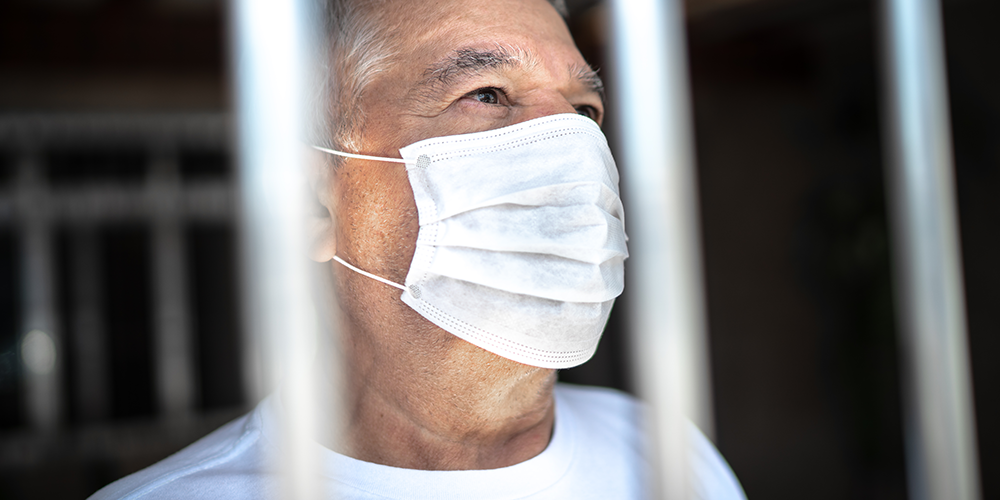Prisons accelerate the spread of multidrug-resistant tuberculosis
1.4 million people die of tuberculosis worldwide each year. Multidrug-resistant strains pose a particular problem because they are so difficult to treat.In a study in Georgia, Basel researchers have demonstrated that prisons play a key role in transmission. The consequences ripple out to Switzerland as well.
25 May 2021
Tuberculosis (TB) claims more lives worldwide than malaria and HIV/Aids combined. As a result of global migration, cases of this deadly infectious disease have also been on the rise in Switzerland since 2007. In 2016, eight young migrants were diagnosed with multidrug-resistant tuberculosis that is difficult to treat.
Studies by a University of Basel research team and the Swiss Tropical and Public Health Institute (Swiss TPH) found that the migrants must have caught the multidrug-resistant germ independently of each other at the Bani Walid refugee camp in northern Libya.
Resistant and virulent
In order to circumvent the effect of antibiotics, the tuberculosis pathogen, Mycobacterium tuberculosis, changes its biological properties and develops what is known as multi-resistance. The pathogen’s adaptability comes at the expense of its virulence. Multidrug-resistant TB strains – so the conventional wisdom goes – have a lower transmission capacity than non-resistant strains.
But laboratory studies and mathematical models have recently shown that in order to compensate for this lower transmission capacity, the multidrug-resistant germs undergo a second «compensatory» mutation. Thanks to this, they have regained their former virulence.
Prisons as transmission sites
What the models predicted has now been empirically proven for the first time in Georgia. A study published in the journal Nature Medicine led by Swiss TPH scientist and Professor of Infection Biology at the University of Basel Sébastien Gagneux shows that not only is the number of multidrug-resistant TB cases in Georgia much higher than in other countries, the multidrug-resistant strains are transmitted directly from person to person, despite their supposed lower level of virulence. While such strains cause 3 % of infections worldwide, they account for 63 percent in Georgia.
Prisons play a prominent role as transmission sites. «The chance of contracting multidrug-resistant tuberculosis in prison is 100 times higher than for a person living outside prison walls,» Gagneux explains. Prisons in Georgia are often overcrowded, rooms are inadequately ventilated, and medical care is poor. These conditions promote the transmission of multidrug-resistant tuberculosis.
But the problem is not confined to prisons, since most inmates are eventually released and continue to carry the TB pathogen. At least 30 percent of all cases of multidrug-resistant tuberculosis in Georgia are related to a prior prison stay, the study finds.
Crucial compensatory mutation
For their study, Sébastien Gagneux and his team sequenced multidrug-resistant tuberculosis strains from all patients in Georgia, including all prison inmates, between 2011 and 2016. They compared the virulence of multidrug-resistant strains that had undergone a compensatory mutation with those that had not. They found that the virulence of pathogens with such a mutation was 30 percent higher. In addition, they observed that pathogens from prison inmates were likely to have compensatory mutations.
The results of this study indicate that not only do prisons promote transmission of multidrug-resistant strains of tuberculosis, but that this particular environment may also lead to increased virulence of these multidrug-resistant pathogens.
Race against time
Despite these unsettling developments, comparably little money is spent on developing new agents against the infectious disease.It is true that three new antibiotics for the treatment of multidrug-resistant tuberculosis have been approved in recent years, but resistance to this new generation of drugs has already been demonstrated. «The fight against multidrug-resistant tuberculosis is a constant race against time,» Sébastien Gagneux says.
Originalpublikation
Gygli SM., Loiseau C., Jugheli L., et al
Prisons as ecological drivers of fitness-compensated multidrug-resistant Mycobacterium tuberculosis
Nature Medicine (2021), doi: 10.1038/s41591-021-01358-x



